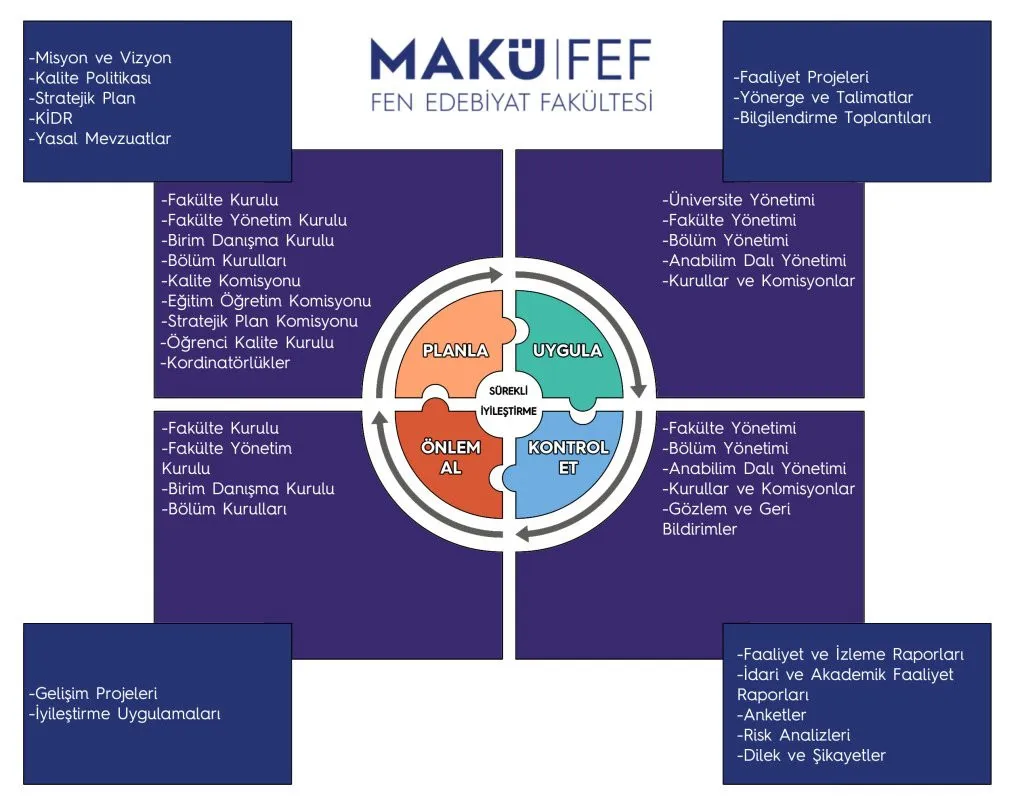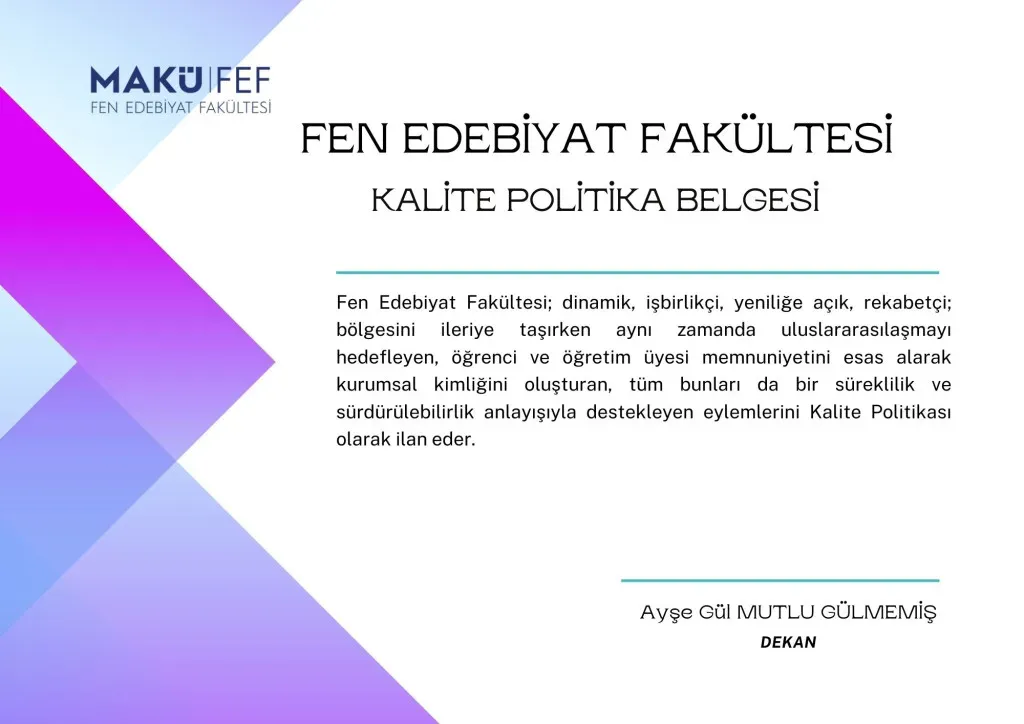Unit Quality Commission President
Prof. Dr. Hale SEÇİLMİŞ CANBAY
Unit Quality Commission Members
Prof. Dr. Celaleddin ŞENÇİMEN
Prof. Dr. Ayça POLAT BECKS
Assoc. Prof. Dr. Mustafa ÖZTOP
Assoc. Prof. Dr. Siğnem ÖNEY BİROL
Assoc. Prof. Dr. Hakan YILMAZ
Dr. Lecturer Şükrü ÜNAR
Dr. Lecturer Güngör GÖÇER
Dr. Lecturer Mustafa UTLU
Dr. Lecturer Emine GÜLER
Res. Asst. Alperen ÖZDEMİR
Halil ÖZ (Faculty secretary)
Fatema ZARZOUR (Student representative)
Esin İNCÜCÜK (Student representative)
Mert BADUR (Student representative)
(1) In line with the faculty's strategic plan and objectives, to establish the institution's internal and external quality assurance system related to the evaluation and improvement of the quality of educational and research activities and administrative services, to identify institutional indicators, to carry out the studies to be conducted in this context in accordance with the procedures and principles determined by the Higher Education Quality Board, and to submit these studies for faculty management approval,
(2) To carry out internal evaluation studies and prepare the annual institutional evaluation report containing the results of institutional evaluation and quality improvement studies and present it to the senate, to announce the approved annual institutional evaluation report to the public on the University's website,
(3) To make the necessary preparations in the external evaluation process, to provide all kinds of support to the Higher Education Quality Board and external evaluator institutions,
(4) Periodically every year, by the beginning of the next calendar year, to create and implement its own annual internal evaluation report, work schedule for the next calendar year, and improvement action plans, taking into account the results of periodic reviews,
(5) To report the data received from the departments to ensure the standard at the faculty level in its studies and reporting,
(6) To carry out improvement studies related to the areas identified in the internal and external evaluation reports that need improvement.


Within the scope of our faculty's quality assurance system, in alignment with our University's 2022-2026 Strategic Plan , it aims for the efficient and effective use of human resources, physical spaces, and educational environments to achieve our faculty's mission and vision.
In our faculty, studies related to the quality assurance system are carried out in coordination by our Department Heads, Boards-Coordinators, and Unit Quality Commission, in line with the goals specified at our University's https://kalite.mehmetakif.edu.tr address. Within the scope of the quality assurance system, the educational and teaching activities of our faculty's academic units are evaluated with periodic student feedback, and issues related to improving quality are reviewed based on these evaluation results. The department-unit evaluations sent by our University throughout the year are also evaluated by our Department Heads.
Our students can convey their requests and complaints to us through ÖDEMER (Student Support Center) (ÖDEMER). The activities related to the educational and teaching processes of our faculty's academic units are controlled through the Distance Education Center. If there are practices that will positively affect the quality of education and teaching or disruptions in the education process, our unit officials responsible for UZEM provide instant information and necessary support through the social network group, of which all our faculty's academic staff are members.
Our faculty contributes to student learning mobility through national and international protocols. In accordance with Erasmus+ and Mevlana agreements, our students have the opportunity to study in different countries and develop themselves globally. For our faculty's Erasmus+ Bilateral Agreements click here.
In the diploma supplement, information about the graduation date, diploma number, level of the degree obtained, its content and areas of use, the University's education and evaluation principles, and the national education system is included. The diploma supplement is prepared electronically by the Student Affairs Department based on a model developed by the European Commission, the Council of Europe, and UNESCO/CEPES, according to the Student Affairs Information Management System, and is signed by the Head of the Student Affairs Department with an e-signature/wet signature.
The educational and teaching objectives and program outcomes of the undergraduate programs conducted in the academic units of our faculty are evaluated within the “Turkey Higher Education Qualifications Framework (TYYÇ)” and specific qualifications for the field are also taken into consideration. Educational programs are carried out according to the goals set by the TYYÇ, which was developed within the scope of the “European Higher Education Area Qualifications Framework.” For example, course credits are assigned based on the student workload required to acquire the knowledge, skills, and competencies foreseen on a program basis as determined in the “Turkey Higher Education Qualifications Framework,” and educational programs are implemented as 30 ECTS per semester. Detailed information about the academic units where undergraduate programs are located can be accessed at https://obs.mehmetakif.edu.tr/oibs/bologna/. The relationship of the programs with TYYÇ can be accessed at https://obs.mehmetakif.edu.tr/oibs/bologna/.
In the educational and teaching activities conducted in our faculty, the design based on student workload is determined by considering YÖKAK and ECTS. In our faculty, in the calculation of ECTS, 30 ECTS corresponds to the workload of one semester, 60 ECTS to the workload of one year, and 1 ECTS = 25–30 hours of workload. The educational objectives and program outcomes of the programs are planned to present what the student will learn based on program outcomes in a measurable way during the learning process. In determining the student workload, the in-class and out-of-class studies and exams related to the course that the student undertakes to achieve the targeted learning outcomes are taken into consideration. The ECTS determined based on workload is publicly announced under the name “ECTS Information Package” on our university's official website, at https://obs.mehmetakif.edu.tr/oibs/bologna/ in the subheadings of the academic units of our faculty.
ECTS studies continue in all academic units of our faculty (https://obs.mehmetakif.edu.tr/oibs/bologna/). Additionally, our faculty contributes to student learning mobility through national and international protocols it has established.


